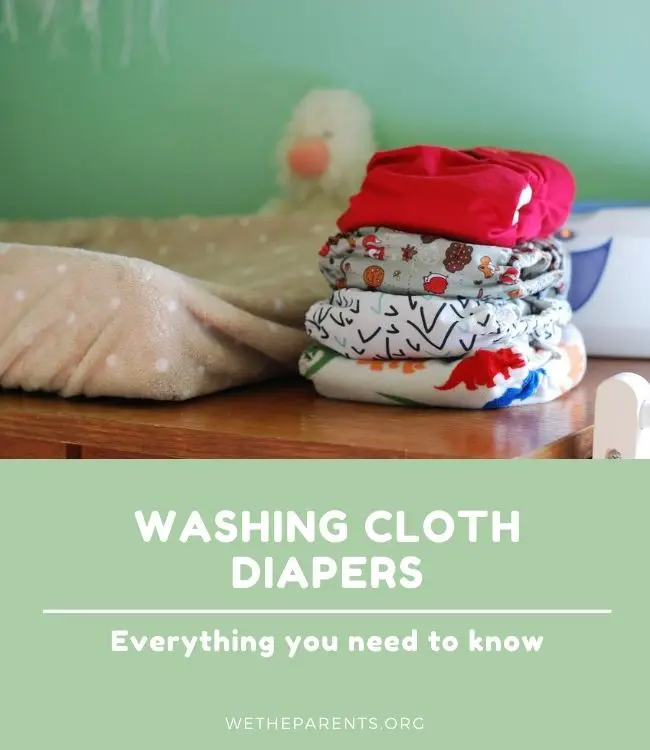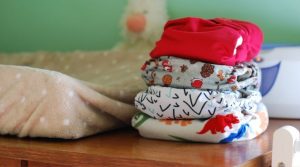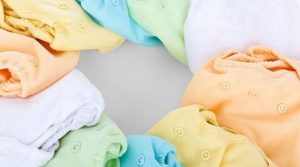Like most other parenting decisions you make, picking either cloth or disposable diapers is a personal choice.
There are many reasons to choose cloth diapers, from saving money to cutting down on environmental waste to just the adorable patterns!
Chances are you’ve been doing some research of your own and have decided to go with cloth diapers. So here’s where we come in. Now it’s time to learn how to wash them — but don’t worry — it’s not as hard as you think.
Getting started with cloth diapers
While cloth diapers do cost more upfront, the investment pays off as the months (and years) go by.
Cloth diapers do need changing more promptly because they don’t draw away wetness like disposable diapers, and you’ll use more water due to the extra laundry.
Choosing to use cloth diapers will depend on your schedule, how committed you are, and even how many other children you have or plan to have.
Cloth diapers reduce your carbon footprint, leak less than disposables, and are great for sensitive skin because there are no ingredients or chemicals – just fabric!1Shanon, A., Feldman, W., James, W., & Dulberg, C. (1990). Diapers: what do parents choose and why?.
Canadian Family Physician, 36,, 1705.
ncbi.nlm.nih.gov
Having made the initial investment of buying 24 to 30 cloth diapers, use them for however long your child is in diapers, keep them for subsequent children, or possibly sell them on.
It’s essential you take good care of them, learning how to properly rinse, wash, and dry your cloth diapers. There’s a learning curve with washing cloth diapers, and most parents find it more than worth the effort.
As with every other aspect of caring for your baby, you’ll soon find a rhythm that works for you. There are many methods for washing cloth diapers, but we found the following one to be the most straightforward and effective for busy moms and dads.
Related: Best Cloth Diapers 2021 (Ultimate Guide & Top Picks)
Diaper sprayer or dunk and swish?
Rinsing the diapers with warm water right after they are soiled can make the washing process far easier.2Jacobson, B., Loeffler, G., & Blaesi, L. (2004). Diapering your baby. Family; no. 8.501.Consumer series. Family; no. 8.501.
kidshealth.org
You can either use a diaper sprayer over the toilet or simply dunk them in (if you’re feeling brave). Diaper sprayers are available on Amazon for around $30 and, while they may not seem necessary, many moms swear by them!
Washing out diaper waste shouldn’t be necessary if you have a breastfed baby not yet on solids. Once your child is on solids, you can also empty out and flush the waste immediately.
Disposable diaper liners are helpful if you would rather not pre-rinse. The liners go inside the diaper and can be thrown out or flushed.
After rinsing, diapers can be stored in a diaper pail. This prevents further contact with the soiled diapers and the potential spread of infection.3Safety steps are necessary when dealing with dirty diapers
canr.msu.edu/news/safety_steps_are_necessary_when_dealing_with_dirty_diapers
Waterproof cloth liners help make your pail easy to empty and can be thrown into the wash along with the diapers.
Make sure to always carry a wet bag when you’re out so that you can store dirty diapers in your diaper bag without making a mess.
A reusable wet bag is waterproof, washable, and can hold several dirty diapers while you’re out of the house.
Washing cloth diapers
Simplicity is key when it comes to taking care of cloth diapers. They are safe to be washed in your washing machine unless the company specifies otherwise.
There are misconceptions that cloth diapers need to be hand washed or that putting them in your washing machine is unsanitary, but this is not the case. Start with a cold-water rinse followed by a hot water wash.4Diapers: Disposable or Cloth?
healthychildren.org/English/ages-stages/baby/diapers-clothing/Pages/Diapers-Disposable-or-Cloth.aspx
The cold water helps reduce stains. This can be a quick cycle with either no detergent or just a small amount. Otherwise, you can leave the diapers soaking in the cold water to lift stubborn stains.
Follow it up with a wash with very hot water and a regular amount of detergent (though not too much). This makes the diapers clean and bacteria-free, which is especially important when dealing with dirty diapers.
Make sure to set the washing machine for the maximum amount of water and use an extra rinse cycle. If you have a front-loading washer or one with a sensor for water levels, you may want to throw in a towel or two to trick your washer into adding more water to the load.
You can also add a scoop of baking soda to keep the diapers looking and smelling fresh.5How to wash cloth diapers
healthline.com/health/how-to-wash-cloth-diapers#step-by-step
If the diapers still smell, wash or rinse them again. Properly washed diapers will not smell dirty. When in doubt, rinse, rinse, rinse!
Keep in mind that diaper covers don’t need to be washed as often as diapers. Throw them in whenever there’s a blowout or if they begin to smell. You may be able to wash them with your diapers, or they may have different washing instructions, especially if made of wool.
Editor’s Note:
It’s recommended to wash soiled diapers separately from other laundry. This prevents contact with the rest of the family’s laundry, and avoids the use of detergents and fabric softeners that could cause skin sensitivity in infants.6Diapering Your Baby
kidshealth.org/en/parents/diapering.html
Gonna soak up the sun
The best way to dry your diapers is on a clothesline in the sun. The sun is your best bet at killing any remaining bacteria and getting out those pesky stains.
A nice soak in the sun even leaves them smelling better and is environmentally friendly, which is probably one of the reasons you chose cloth diapers in the first place.
Unfortunately, this isn’t possible for many people due to living arrangements or weather. It also takes longer than throwing them in the dryer.
If you can air dry inside, that’s another good option, although it will take longer. The fastest method, of course, is throwing them in the dryer on low heat.
Be careful not to use high heat, which will damage your diapers. Some diapers may have specific drying instructions, if so be sure to follow them. Attach any Velcro tabs so that your diapers don’t stick together.
Related: How to Use Cloth Diapers
Choosing the right detergent
Hard water contains minerals such as calcium and magnesium that prevent soap from making suds and cleaning well. This can leave behind residue, particularly on diapers.
Most detergents have additives that help them make suds, though many of the more natural detergents recommended for cloth diapering do not.
A DIY test for finding out your water type is to fill up a clear bottle with water from your faucet. Add pure liquid soap (not detergent) and shake for ten seconds.
If you have soft water, there will be a lot of suds at the top, and clear water at the bottom. If it’s hard water, you’ll have cloudy water without many suds.
What is buildup and how to avoid it?
More common if your water is hard, buildup occurs when mineral deposits and residue begin to cause a barrier on the fabric.
Buildup causes diapers to leak and smell and stops them from performing as they should. Sometimes using too much detergent can cause a soapy buildup preventing cloth diapers from getting clean.
Try using less detergent or adding an extra rinse, especially if you see suds after a wash cycle. If you suspect your diapers have buildup on them, you can run several hot cycles without detergent or use RLR Laundry Treatment to strip them.
When buildup becomes noticeable, or if someone uses diaper cream by accident, you could also use a toothbrush and some Dawn dish soap to gently remove the residue.
Will I damage the cloth diapers?
First things first — read any and all tags and instructions, as most companies specify their recommendations, with some even voiding warranties for using certain products.
Disinfectants, fabric softeners, and dryer sheets can cause more trouble than they’re worth with cloth diapers.
Bleach and vinegar can both be too harsh when used often, and borax, fabric softener, and dryer sheets should be avoided due to residue. Many parents recommend employing reusable dryer balls when drying cloth diapers.
You also need to choose diaper creams and ointments carefully as some will stain diapers. Use disposable diapers for the duration of a bad diaper rash or yeast infection. This can sometimes lead to its resolution.
Avoiding these products will help lengthen the life of your cloth diapers and truly make them worthy of your investment.
How do I remove stains on cloth diapers?
If you’re avoiding your arsenal of stain-fighting ingredients, it’ll be hard to get out those stubborn cloth diaper stains.
And they will happen! Make sure to wash with cold water first, as hot water can lock in stains. Your first step towards removing stains should always be laying diapers out in the sun after washing.
Leave them out all day in full sun and wet them again if necessary. Adding lemon juice before sunning can help loosen stains, but make sure to wash before use.
Other mom-recommended products include Buncha Farmers All-Natural Stain Removers and OxiClean. While some experts will tell you to avoid OxiClean, many parents use it without any problems, and it works best in hard water.
How often should I wash cloth diapers?
One of the most common queries when learning how to use cloth diapers is how often they need to be washed. You’ll need to wash your diapers every couple of days, three at the most, or they may start to mildew.
Staining, smells, and wear and tear, will also be reduced by how often you wash. Every other day is a good rule of thumb.
Your baby will begin to go through fewer diapers as they get older, but don’t hold back on how often you throw them in the wash.
It’s best to wash cloth diapers separately from your other laundry. Diapers will not get as clean and may start to pill if you overload the washer.
Wrapping Up
As parents, we know that you’ll be much more likely to stick with cloth diapers if you find a detergent and washing process that works for you.
While it may be tempting to commit to the greenest, most expensive laundry detergent or an arduous washing and drying process, aim to help your future self.
Cloth diapers can seem intimidating, but they don’t have to be. We know many moms that found a wash routine that worked for their families, and ultimately saved money and helped the environment. Go ahead, go check out those cute patterns!




